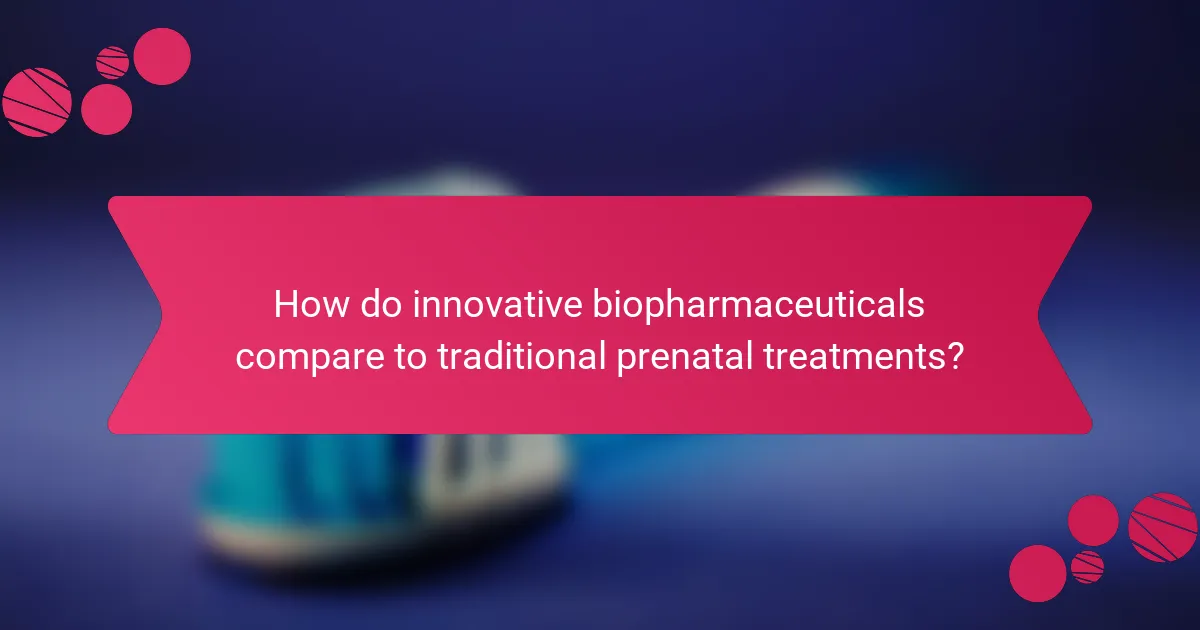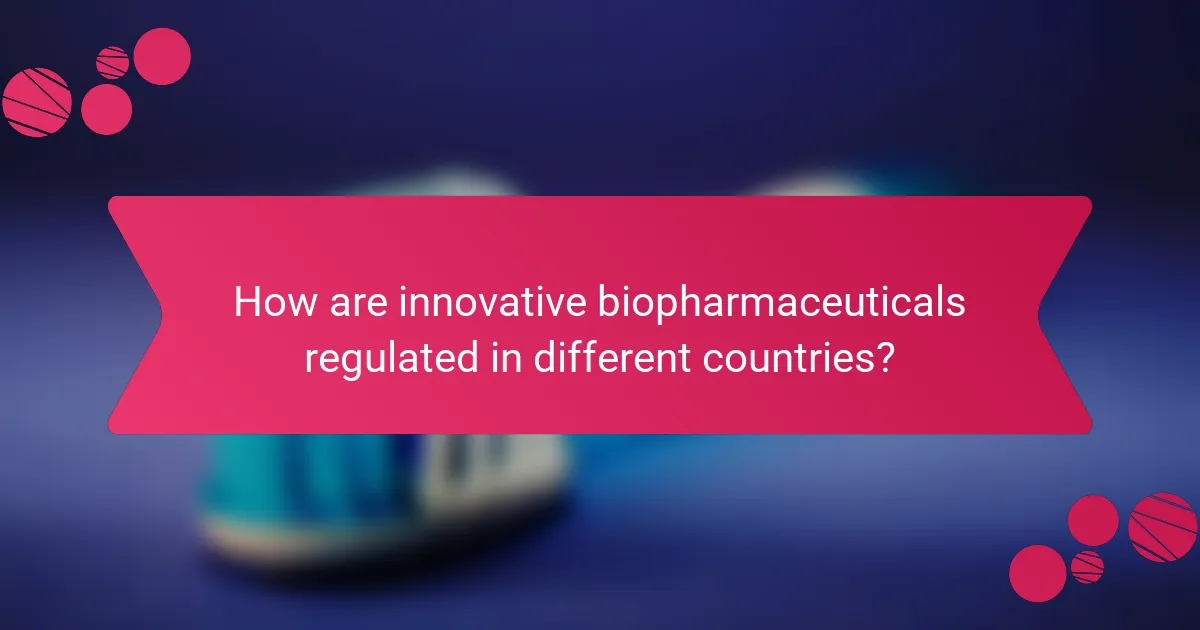Innovative biopharmaceuticals significantly enhance prenatal care by improving maternal health and fetal development while targeting specific conditions like gestational diabetes and preeclampsia. However, they also carry potential risks, including adverse reactions and limited long-term safety data. This article explores the advanced treatment options offered by these therapies compared to traditional methods, highlights unique attributes of specific biopharmaceuticals, and provides recommendations for safe integration into prenatal care. Regular monitoring and collaboration with healthcare providers are essential for optimizing outcomes.

What are the primary benefits of innovative biopharmaceuticals in prenatal care?
Innovative biopharmaceuticals offer significant benefits in prenatal care, including improved maternal health, reduced complications, and enhanced fetal development. These therapies can target specific conditions like gestational diabetes and preeclampsia, leading to better outcomes.
Additionally, they often provide personalized treatment options based on genetic profiles, increasing effectiveness. As a result, innovative biopharmaceuticals are transforming prenatal care by ensuring safer pregnancies and healthier infants.
How do these biopharmaceuticals improve maternal health outcomes?
Innovative biopharmaceuticals significantly enhance maternal health outcomes by addressing complications during pregnancy. They reduce risks such as gestational diabetes and preeclampsia through targeted therapies. For instance, medications that regulate blood pressure can prevent severe outcomes for both mother and child. Additionally, these biopharmaceuticals often provide personalized treatment options, improving overall prenatal care. As a result, they contribute to healthier pregnancies and better long-term health for mothers and infants.
Which specific conditions can be treated with biopharmaceuticals during pregnancy?
Biopharmaceuticals can treat conditions such as gestational diabetes, preeclampsia, and certain autoimmune disorders during pregnancy. These medications offer targeted therapies that can benefit both mother and fetus. For example, insulin analogs manage blood sugar levels effectively. However, careful evaluation of risks is essential to ensure safety. Regular monitoring and collaboration with healthcare providers are recommended to optimize treatment outcomes.
What role do innovative biopharmaceuticals play in fetal development?
Innovative biopharmaceuticals significantly support fetal development by enhancing nutrient absorption and reducing risks of congenital disorders. They provide targeted therapies that can improve maternal health, ultimately benefiting the fetus. For instance, prenatal vitamins formulated with advanced biopharmaceuticals can ensure optimal levels of folic acid, crucial for neural tube development. Additionally, these products may offer unique attributes, such as specific formulations for high-risk pregnancies, which are rarely available in traditional prenatal care. Overall, the integration of innovative biopharmaceuticals in prenatal care presents a promising approach to fostering healthier fetal outcomes.

What are the potential risks associated with biopharmaceuticals in prenatal care?
Innovative biopharmaceuticals in prenatal care carry potential risks, including adverse reactions, long-term developmental effects, and limited safety data. These risks may vary based on the specific biopharmaceutical used and the individual patient’s health profile. Monitoring and consultation with healthcare providers are essential to mitigate these risks.
How can side effects impact maternal and fetal health?
Side effects can significantly impact maternal and fetal health by causing complications during pregnancy. Adverse reactions to biopharmaceuticals may lead to conditions such as preterm labour, gestational hypertension, or fetal growth restrictions. For instance, certain medications can cross the placenta, affecting fetal development and resulting in birth defects. Monitoring and managing these side effects are crucial to ensure the safety of both mother and child. Healthcare providers must weigh the benefits of innovative treatments against potential risks to optimize prenatal care.
What precautions should be taken when prescribing biopharmaceuticals to pregnant women?
Precautions when prescribing biopharmaceuticals to pregnant women include thorough risk assessment, monitoring for adverse effects, and considering alternative treatments. It is crucial to evaluate the benefits against potential risks to fetal development. Healthcare providers must stay informed about the latest research and guidelines related to biopharmaceutical use in pregnancy.

How do innovative biopharmaceuticals compare to traditional prenatal treatments?
Innovative biopharmaceuticals offer advanced treatment options for prenatal care compared to traditional methods. They often provide targeted therapies with fewer side effects, improving maternal and fetal outcomes. Traditional treatments typically rely on older medications with broader effects and potential risks.
Innovative biopharmaceuticals can include biologics that specifically address conditions like gestational diabetes or preeclampsia. These therapies may enhance efficacy and safety profiles, reducing hospitalisation rates. In contrast, traditional treatments may not offer the same level of precision, leading to varied results among patients.
The risks associated with innovative biopharmaceuticals include limited long-term data and potential unknown side effects. Traditional treatments have a well-established safety profile but may not be as effective in specific cases. Recommendations for prenatal care should consider the individual patient’s health status, preferences, and the latest clinical evidence to make informed choices.
What are the differences in efficacy between biopharmaceuticals and conventional medications?
Biopharmaceuticals often demonstrate higher efficacy than conventional medications due to their targeted mechanisms and biological origins. They offer unique benefits, such as improved safety profiles and specific action against disease pathways. Conventional medications may have broader applications but can lack the precision of biopharmaceuticals. For prenatal care, biopharmaceuticals can address specific conditions effectively, while conventional medications might not provide the same level of targeted intervention.
Which factors influence the choice between biopharmaceuticals and traditional treatments?
The choice between biopharmaceuticals and traditional treatments is influenced by factors such as efficacy, safety profile, cost, and patient-specific needs. Biopharmaceuticals often offer targeted therapies with fewer side effects, while traditional treatments may be more established and accessible. Additionally, the unique attributes of each treatment type can significantly impact patient outcomes and preferences. As a result, healthcare providers must consider these factors to tailor treatment plans effectively.

What are the unique attributes of specific biopharmaceuticals used in prenatal care?
Unique attributes of specific biopharmaceuticals used in prenatal care include targeted delivery mechanisms, enhanced bioavailability, and safety profiles tailored for pregnant women. For instance, certain biopharmaceuticals utilize lipid-based formulations to improve absorption, ensuring that critical nutrients reach the developing fetus effectively. Additionally, some products are designed with minimal side effects, addressing common concerns during pregnancy. These attributes contribute to the overall efficacy and safety of prenatal treatments.
What differentiates monoclonal antibodies from other biopharmaceuticals in pregnancy?
Monoclonal antibodies differ from other biopharmaceuticals in pregnancy due to their targeted mechanism and specificity. Unlike traditional medications, monoclonal antibodies offer precise action against specific antigens, minimizing side effects. Their unique attribute is the ability to provide passive immunity to the fetus, which is crucial during prenatal care. Additionally, they can be engineered for various therapeutic purposes, enhancing treatment efficacy for conditions like autoimmune diseases in pregnant women. However, the rare attribute of potential immunogenicity must be considered, as it may lead to adverse reactions.
Which biopharmaceuticals are currently leading in research and development for prenatal applications?
Current leading biopharmaceuticals in prenatal applications include folic acid supplements, progesterone therapies, and monoclonal antibodies targeting specific conditions. These innovations aim to enhance maternal and fetal health. Folic acid reduces neural tube defects, while progesterone supports pregnancy maintenance. Monoclonal antibodies provide targeted treatment for conditions like preeclampsia, showcasing unique attributes that improve prenatal outcomes. Ongoing research focuses on safety and efficacy to mitigate risks associated with these therapies.

How are innovative biopharmaceuticals regulated in different countries?
Innovative biopharmaceuticals are regulated differently across countries, impacting prenatal care access. In the United States, the FDA oversees rigorous testing and approval processes, ensuring safety and efficacy. The European Medicines Agency (EMA) follows similar protocols but emphasizes collaboration among member states for market authorization. In Japan, the Pharmaceuticals and Medical Devices Agency (PMDA) focuses on expediting approvals for innovative treatments. Each regulatory body considers unique attributes such as local health needs and market dynamics, influencing the availability of biopharmaceuticals for prenatal care.
What are the regulatory challenges faced by biopharmaceutical companies in prenatal care?
Biopharmaceutical companies face significant regulatory challenges in prenatal care, including stringent safety and efficacy requirements. These companies must navigate complex approval processes that often require extensive clinical trials. Additionally, varying regulations across regions can complicate product development and market access. Compliance with guidelines from agencies like the FDA and EMA is essential but can be resource-intensive. Moreover, the unique nature of prenatal care necessitates careful consideration of maternal and fetal health, adding layers of ethical and regulatory scrutiny.
How do approval processes vary across regions for prenatal biopharmaceuticals?
Approval processes for prenatal biopharmaceuticals vary significantly across regions due to differing regulatory frameworks. In North America, the FDA requires extensive clinical trials to ensure safety and efficacy, while the European Medicines Agency emphasizes risk-benefit assessments tailored to maternal and fetal health. In contrast, some regions may have expedited pathways for innovative therapies, enabling faster access. These variations impact the availability and adoption of prenatal treatments globally, highlighting the importance of understanding local regulations in prenatal care.

What recommendations do experts have for the use of biopharmaceuticals in prenatal care?
Experts recommend cautious integration of biopharmaceuticals in prenatal care, emphasizing individualized treatment plans. They highlight the benefits of targeted therapies while acknowledging potential risks such as adverse reactions. Regular monitoring and collaboration among healthcare providers are essential for optimizing outcomes. Furthermore, ongoing research is crucial to enhance understanding of long-term effects on both mothers and infants.
How should healthcare providers approach patient education regarding biopharmaceuticals?
Healthcare providers should prioritize clear, evidence-based communication when educating patients about biopharmaceuticals. This involves discussing the innovative benefits, potential risks, and specific recommendations for prenatal care.
Providers should focus on the unique attributes of biopharmaceuticals, such as their targeted mechanisms and efficacy in treating specific conditions during pregnancy. They must also address rare side effects and emphasize the importance of individualized treatment plans.
Engaging patients through interactive discussions can enhance understanding and adherence. Providers should encourage questions and provide accessible resources to reinforce learning.
Finally, ongoing education about new developments in biopharmaceuticals will empower patients to make informed decisions regarding their prenatal care.
What best practices should be followed when integrating biopharmaceuticals into prenatal care plans?
Integrating biopharmaceuticals into prenatal care plans requires careful consideration of benefits, risks, and patient-specific factors. First, assess the unique health needs of the mother and fetus to tailor treatments effectively. Second, monitor for potential adverse effects, as some biopharmaceuticals may pose rare risks during pregnancy. Third, ensure clear communication between healthcare providers and patients regarding treatment options and expected outcomes. Finally, follow updated clinical guidelines and recommendations to optimize prenatal care with innovative biopharmaceuticals.
